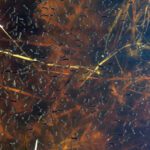Home »

Province seeks to block deadly ungulate disease
The provincial government is launching a public awareness campaign to try and help prevent a disease that is killing deer, elk and moose in some areas of Alberta and Saskatchewan, from crossing the border into British Columbia.
 To support the campaign, the province has set up signs on Highway 49 near Dawson Creek and on Highway 3 near Sparwood, reminding hunters not to bring intact deer carcasses into B.C. The signs were developed with the support of the Peace River Regional District, the Guide Outfitters Association of BC, the BC Wildlife Federation and the Habitat Conservation Trust Foundation.
To support the campaign, the province has set up signs on Highway 49 near Dawson Creek and on Highway 3 near Sparwood, reminding hunters not to bring intact deer carcasses into B.C. The signs were developed with the support of the Peace River Regional District, the Guide Outfitters Association of BC, the BC Wildlife Federation and the Habitat Conservation Trust Foundation.
Hunters can still bring the meat from their hunt back to B.C. Possession of an out-of-province hide, antler, or part of a skull is also permitted, providing they have been treated in a way that removes all tissue. For detailed information on the requirements for processing out-of-province deer moose and elk, visit: http://www.env.gov.bc.ca/wld/documents/wldhealth/CWD_program_update_spring2013.pdf
Chronic Wasting Disease, or CWD, is a progressive, fatal nervous system disease that affects members of the deer family, including white-tailed deer, mule deer, moose and elk. The disease is caused by an abnormal protein and can spread when a healthy animal comes into contact with an infected animal, infected tissue or even soil contaminated by the protein. The disease may also have been detected in big horn sheep.

The disease, with heavy concentrations found in some areas of the United States was first identified in Canada in 1996, and despite attempts to manage it, CWD continues to spread in Saskatchewan and Alberta. The province has been working since 2001 to keep CWD out of B.C. and in 2010 passed a regulation to restrict the transport of high-risk tissues of hunted animals into B.C. The province continues to monitor for the disease and so far no infected animals have been found in B.C.
CWD is related to bovine spongiform encephalopathy, which causes mad cow disease. However, the World Health Organization (WHO) does not believe that CWD can be passed from deer to humans. As a precaution, WHO warns people not to eat the meat from infected deer.
For more information on CWD visit:
http://www.env.gov.bc.ca/wld/wldhealth/cwd.html
e-KNOW







